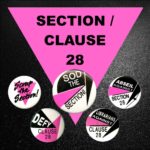Search Result
EQUALITY ACT 2010 AND LGBT+ RIGHTS
Section or Clause 28
 Section 28 was an amendment to the Local Government Act which stated that a local authority
Section 28 was an amendment to the Local Government Act which stated that a local authority
"shall not intentionally promote homosexuality or publish material with the intention of promoting homosexuality" or "promote the teaching in any maintained school of the acceptability of homosexuality as a pretended family relationship".
The amendment was enacted on 24 May 1988 by Margaret Thatcher's government.
It is widely considered to be one of the most pernicious and harming pieces of legislation to be passed by a UK government in recent decades, affecting the lives of LGBT people up and down the country and those charged with their care and education.
pernicious adjective
1. causing insidious harm or ruin; ruinous; injurious; hurtful: pernicious teachings; a pernicious lie.
2. deadly; fatal: a pernicious disease.
3. evil; wicked.
No one was ever prosecuted under this provision of the law, but it was always enforced. Its name represents the clause number it once held in the 1988 local government act. It was a Margaret Thatcher’s sop to her homophobic backbenchers as her long prime ministership droned on and the neo-Conservative wing of her party became jittery.
It sought to ban local authorities from ‘promoting homosexuality’ as an equal lifestyle. Because it was poorly written, people were unclear if it included local authority schools, young clubs and support services. Whether the legislation meant to include these local services or not, to all intents and purposes it did, and the affects where disastrous.
The legislation was used by many to not just avoid talking about lesbian, gay, bisexual and trans people in the curriculum, but also as an excuse for homophobic and transphobic bullying. It was used to discipline LGBT people in education and hound teachers – ‘out’ or otherwise – out of the classroom altogether.
We should never forget the pain caused by Section 28 | Huff Post | 25 May 2018
In February 2000, the first attempted legislation to repeal Section 28 was introduced by the Labour Government as part of the Local Government Act 2000, but was defeated by a House of Lords campaign led by Baroness Young. Then Shadow Education Secretary and future Prime Minister of the United Kingdom Theresa May called the defeat "a victory for commonsense".
Section 28 was finally repealed on 21 June 2000 in Scotland and on 18 November 2003 in the rest of the United Kingdom.
Section 28 | Wikipedia
What is Section 28? | Pink News | 23 May 2018 | 4m 36s
Twenty years after section 28 repeal, lessons still need to be learned from UK’s homophobic law | The Conversation | 16 Nov 2023
Blue Jean: The lesbian teachers who inspired film about Section 28 | BBC | 10 Feb 2023
Section 28: What was it and how did it affect LGBT+ people? | BBC | 1 Nov 2019
We should never forget the pain caused by Section 28 | Huff Post | 25 May 2018
What was Section 28? The history of the homophobic legislation 30 years on | Pink News | 24 May 2018
Section 28 protesters 30 years on: ‘We were arrested and put in a cell up by Big Ben’ | The Guardian | 27 Mar 2018
Section 28 gone ... but not forgotten | The Guardian | 17 Nov 2013
18 November 2003: Section 28 bites the dust | Stonewall | 18 Nov 2003
Section 28 to be repealed | BBC | 18 Sep 2003
Outrageous! The Story of Section 28 and Britain’s Battle for LGBT Education | Paul Baker | Reaktion Books
↑ Back to top
